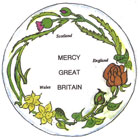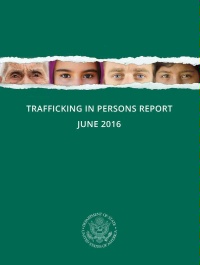|
It is only in recent years that the general public is becoming aware of human trafficking. The reality is that for many years human trafficking has been a growing industry in Great Britain for unscrupulous men and women willing to buy and sell people into slavery.
 Sisters of Mercy in the UK are ‘good news’ for many trafficked victims and survivors in many different ways. The Sisters operate within three independent groups: the Union, the Federation, and the Institute. While Northern Ireland (NI) is politically part of UK, the Mercy sisters in NI, link with the dioceses and Church in the rest of Ireland. Sisters of Mercy in the UK are ‘good news’ for many trafficked victims and survivors in many different ways. The Sisters operate within three independent groups: the Union, the Federation, and the Institute. While Northern Ireland (NI) is politically part of UK, the Mercy sisters in NI, link with the dioceses and Church in the rest of Ireland.
Partnerships in Response to Human Trafficking
The Sisters ministering in Handsworth Convent, Birmingham (Union), are a collaborative community drawn from Sisters of Mercy of Great Britain and Ireland. In the recent past, following a request by the police for a ‘safe place’ ,some trafficked women were accommodated there. At St Mary’s Centre in the building Sisters and co-workers network with other Faith Groups and Organizations who provide similar care for women and children and where trafficked females are often encountered. The Sisters were among the founding members of Birmingham Citizens and continue to help address the needs of a large multi-cultural city.
Sisters of Mercy of the Union have financially supported the establishment of Bakhita House in the Diocese of Westminster. Opened in 2015, the house is specifically used to support women who have been trafficked. 12 religious congregations provide services in Bakhita House and Mercy Sisters engage with Recruitment and Policies. St Catharine’s Convent, Edinburgh, Scotland is a Mercy Centre, offering a wide range of services to many needy people, including Recovery programmes, often taken up by survivors of human trafficking.
Sisters are also working in the Lebanon and Addo, South Africa. In Addo the sisters work in partnership with the Marist Fathers and contribute to education. Recently a Sister attended a conference, ‘Human Trafficking in Africa’, held in Port Elizabeth. The booklet for the day’s reflection states: ‘Human Trafficking is a very hidden crime growing in Africa and modern day slaves are i) cheap and ii) disposable.’ Participants were reminded that one of the best defences against human trafficking is education. The Sisters are concerned about the magnitude of human trafficking issues in their adopted country. Following the workshop and the setting up of a local committee, planning began on organising a convention to help inform the local communities about the reality of human trafficking and encourage them to take action to help eradicate it.
Members of the Sisters of Mercy of the Federation are engaged in education programmes to inform themselves about all aspects of human trafficking. Many sisters actively support the work of the Medaille Trust through donations, supporting its regular magazine, or volunteering. It was established in 2006 by representatives of male and female religious congregations out of the work of its visionary Sister Ann Teresa Herrity SSJA. Its main focus is in providing safe accommodation and after-care services for victims of trafficking.
Sisters of Mercy of the Institute is the third strand of the Mercy family in Great Britain. Institute Sisters are ministering throughout Britain, with some working in Peru, Kenya, Romania and South Sudan. A number of sisters are involved in services and ministries addressing the needs of women and children.
 Mercy establishes the ‘Women@Well’ Centre Mercy establishes the ‘Women@Well’ Centre
The Mercy Institute set up pioneering services at the centre known as Women@Well in London. There the Sisters and their co-workers care for vulnerable women, women in prostitution and those who have been trafficked. Inspired by the foresight of Lynda Dearlove rsm, the Institute completed the restoration of a designated building at King’s Cross, in 2006, so that W@W centre could be established there.
The Centre is an innovative women-only charity which provides services to women trapped in multiple cycles of abuse and social exclusion. Women, caught up in the many facets of pavement culture e.g homelessness, prostitution, drugs, alcohol, violence, physical and mental ill health, are ‘often kept locked into chaos by the complexity of official services’. To address this issue all services in W@W are provided for women, by women, in a supportive environment. Their goal is to divert the service users from the criminal justice system through addressing their needs and giving them meaningful and rewarding opportunities for social participation.
Working in partnership with the London Metropolitan Police Specialist Trafficking Unit ‘women@well’ provides a safe haven for victims rescued by the police from traffickers. W@W representatives and the Met police were part of an EU funded project, ‘Safety Compass’, involving UK, Latvia and Estonia. This initiative entailed cross-border cooperation, research, advocacy, campaigning, conferences and study visits related to models of exit and support for female victims of sex trafficking and prostitution. Following a successful study visit abroad, W@W hosted a 3-day conference and a study visit in London for government officials, police and service delivers from the participating countries. Research findings from this project are available
W@W is also involved in developing services to support employment and training to women who are exiting prostitution and/or are victims of sex trafficking. This work is carried out through partnerships developed with Via Design and Freeset, providing support services and employment to women who were caught up in prostitution or victims of trafficking .
Advocacy Work for UK Modern Slavery Bill
Sister Lynda and representatives of W@W were part of a national co-ordination team in developing a campaign and lobbying strategy alongside the stages of the UK Modern Slavery Bill, focusing on the inclusion of the ‘Nordic Model’ which penalises the ‘demand’ in the Bill . This project also involved briefing some Conservative Peers for its passage through the House of Lords and raised awareness re prostitution and human trafficking issues in the context of the Bill with the Catholic Bishops’ Conference of England and Wales, the Conference of Religious and the National Board of Catholic Women. Following agreement by both Houses of Parliament on the text of the Bill, it received Royal Assent on 26 March 2015. The UK Modern Slavery Bill is now an Act of Parliament and has passed into law.
Action with TRAC Group
Sister Agatha Collopy rsm is a member of TRAC - Trafficking, Raising Awareness and Campaigning group, in London.TRAC grew from members of religious congregations involved in the Medaille Trust and became independent, so that they could challenge the UK Government in respect of new and necessary legislation and raising awareness of the wide range of issues surrounding human trafficking. Many Mercy Sisters are also involved in advocacy work with this group.
Through Mercy Sisters’ long association working with prisoners and those who are homeless, they advocate effectively on their behalf. They have extended their work to include those who are trafficked and, in collaboration with others who are working to eradicate this crime, the lives of victims and survivors of human trafficking are touched.
 Trafficking in Persons (TIP) Report 2016 Trafficking in Persons (TIP) Report 2016
The Trafficking in Persons Report, or TIP Report, is an annual report issued by the U.S. State Department's Office to Monitor and Combat Trafficking in Persons. It ranks governments based on US research of their efforts to acknowledge and combat human trafficking.
In the TIP Report, the Department of State places each country onto one of three tiers based on the extent of their governments’ efforts to comply with the “minimum standards for the elimination of trafficking” found in Section 108 of the TVPA.
View the TIP Report 2016 for the United Kingdom (Tier 1)
|

 Sisters of Mercy in the UK are ‘good news’ for many trafficked victims and survivors in many different ways. The Sisters operate within three independent groups: the Union, the Federation, and the Institute. While Northern Ireland (NI) is politically part of UK, the Mercy sisters in NI, link with the dioceses and Church in the rest of Ireland.
Sisters of Mercy in the UK are ‘good news’ for many trafficked victims and survivors in many different ways. The Sisters operate within three independent groups: the Union, the Federation, and the Institute. While Northern Ireland (NI) is politically part of UK, the Mercy sisters in NI, link with the dioceses and Church in the rest of Ireland.

